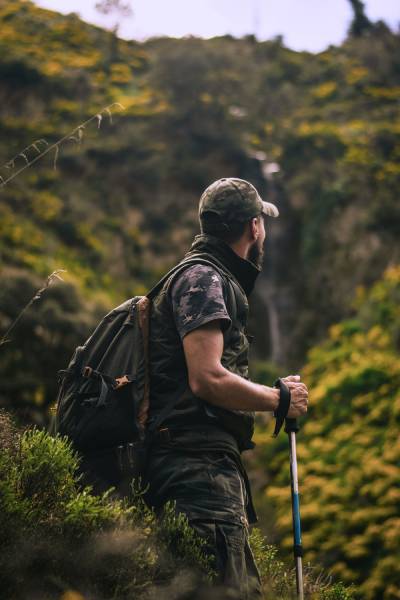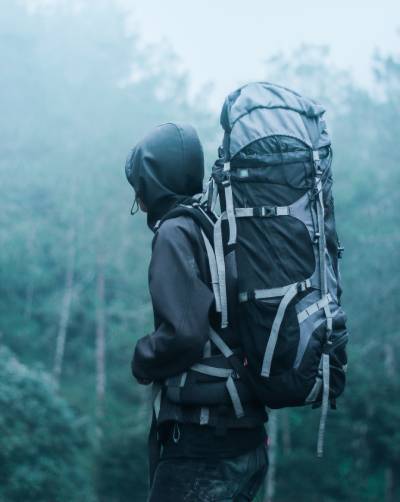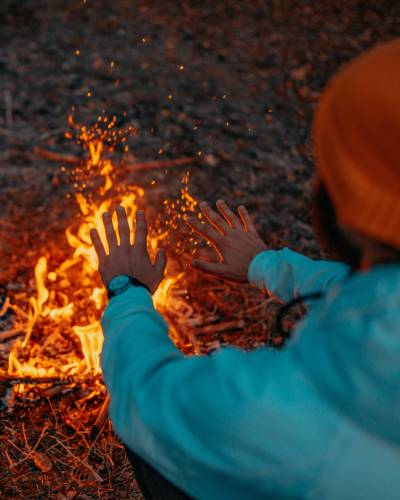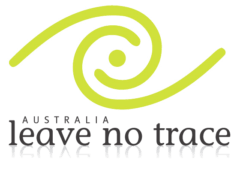This guide promotes the seven principles of LEAVE NO TRACE ethics for minimal impact travel while ushwalking.
This guide is intended to help individual recreational and commercial walkers; tour operators and their clients improve their environmental management and reduce their environmental impact on the land.
IMPORTANCE:
Minimal Impact techniques are not only important to environmental protection and future of the wilderness but also to the satisfaction and positive experience of the outdoor enthusiast.
Plan Ahead and Prepare
- Know the regulations for and special concerns of the area you’ll walk.
- Seek permitting if necessary.
- Schedule your trip for off peak times.
- Prepare for extreme isolation, weather hazards and emergencies.
- Carry and know how to use a map, a compass and/or GPS.
- Take plenty of food and drinking water.
- Repackage food to minimise waste, take some rubbish bags.
- Have appropriate emergency equipment. (Sat. phone, EPIRB, First Aid Kit, flares etc.)
- Carry extra warm and wet weather clothing.
- Give a responsible friend you’re itinerary.
- Notify them on return from isolated trips.
- Carry a small trowel for emergency toileting.

Walk and Camp on Durable Surfaces
- Stay on track.
- Durable surfaces include established tracks and campsites, rock, gravel and dry grasses.
- Protect water sources by camping at least 100 metres from rivers and billabongs.
- Good campsites are found, not made. Altering a site is not necessary.
In popular areas:
- Concentrate use on existing tracks and campsites. Do not create new tracks.
- Always walk on the track even if wet and muddy to avoid widening it.
- Keep campsites small. Focus activity in areas where vegetation is absent.
In natural areas:
- Disperse use to prevent the creation of campsites and tracks.
- Avoid places where impacts are just beginning.
- Stay only one night.
Dispose of Waste Properly
- “Pack it in, Pack it out.” Inspect your campsite and rest areas for rubbish and spilled food.
- Pack and carry out all rubbish and leftover food including organics.
- Do not burn rubbish.
- Be careful not to drop rubbish while walking on tracks.
- When available use established toilet facilities.
- In other situations, carry a trowel and deposit solid human waste in cat holes dug in topsoil – usually 10-15cm deep and at least 100m from water, camp and tracks. Cover and disguise the hole when finished.
- Pack out all hygiene products in a suitable container
- To wash yourself or your dishes, carry water 100 meters from streams and pools and use small amounts of biodegradable soap. Scatter strained dishwater

Leave What You Find
- Respect Indigenous art and other sites of cultural significance. Seek appropriate permission.
- Do not touch rock art which can be damaged by the natural oils from human skin.
- Preserve the past: observe but do not touch cultural or historic structures and artefacts.
- Leave rocks, plants and other natural objects as you find them.
- Avoid introducing or transporting non-native species – do not transport firewood.
- Know non-native species and report sightings of them to appropriate sources.
- Do not travel through Quarantine Areas.
- Avoid transporting mud which may contain dieback fungal spores in boot and tyre treads by cleaning before and after travelling.
- Check clothing and all gear and burn or dispose of all hitchhiker type seeds before and after travelling in different areas.
- Do not build structures, furniture or dig trenches.
Respect Wildlife
- Observe wildlife from a distance. Do not follow or approach them.
- Understand through education the role each species plays in each environment in order to realise the importance of its position within an ecosystem.
- Avoid wildlife during sensitive times: mating, nesting, and raising young. Touching nests or young animals may cause their parents to abandon them.
- Never feed wild animals or birds. Feeding wildlife damages their health, alters natural behaviours, and exposes them to predators and other dangers. Store food and rubbish securely.
- Control pets at all times or better yet, leave them at home. All National Parks restrict pets so check for regulations first.
- Report any injured animals to the local land managers. Do not attempt to handle the animal.
Minimise the Impact of Fires
- Fires can cause devastating and lasting impacts to the bush.
- Check area regulations for fire bans.
- Use a lightweight fuel stove for cooking and enjoy a candle or gas lantern for light.
- Where fires are permitted, use established fire rings, fire pans, or mound fires.
- Do not create new fire-pits.
- Keep fires small. Wood is a habitat for fauna and birds. Use only small sticks that can be broken by hand.
- Burn all wood and coals to ash. Put the fire out completely. Clean out campfires rings after use.
- Consider using candles for light instead of fire. Don’t leave wax residue.
- Be careful of improper cigarette butt disposal. Take butts with you.
Be Considerate of Your Hosts and Other Visitors
- Learn about the cultural history of the land. Recognise, acknowledge and respect local knowledge.
- Respect the wishes and regulations of all Hosts. (Eg. Indigenous, pastoral, land managers and locals)
- Never visit places where you have not obtained appropriate permission. Seek permission and/or a permit.
- Many people will follow after you – help to keep the country healthy.
- Respect other visitors and protect the quality of their experience.
- Be courteous. Give way to others on tracks and roads.
- Have rest breaks in discreet places to minimise impact on other groups. If possible camp out of sight and sound of other visitors. Try not to wear bright coloured cloths or use bright coloured tents that can cause disturbance to animals as well as other recreational users.
- Let everyone enjoy nature’s sounds. Keep noise to a minimum.
- Talk quietly especially when in large groups. Set out reasons and expectations early in the trip.
- Avoid the use of bright lights, radios, electronic games, mobile phones and other intrusive urban devices.


